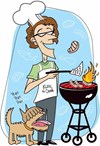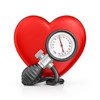Posted 5/18/2013

Just in time for grilling season, a "Recipes for the Grill" section has been added to the the Recipes page.
Check out the new recipes:
Grilled Chicken with Green Chile Sauce
Grilled or Broiled Orange Chicken
Grilled Potatoes
Grilled Sweet Potatoes
Grilled Vegetables
Spicy Grilled Chicken
Teriyaki Kabobs
Vegetable Packets
Posted 5/17/2013
by U.S. Food and Drug Administration

Picnic and barbecue season offers lots of opportunities for outdoor fun with family and friends. But these warm weather events also present opportunities for foodborne bacteria to thrive. As food heats up in summer temperatures, bacteria multiply rapidly.
To protect yourself, your family, and friends from foodborne illness during warm-weather months, safe food handling when eating outdoors is critical. Read on for simple food safety guidelines for transporting your food to the picnic site, and preparing and serving it safely once you’ve arrived.
Posted 5/17/2013
by University of Missouri Extension

Recent health claims have made sea salt a popular choice for consumers, despite the similarities in nutritional value between sea salt and table salt.
“Sea salt is very popular right now, but consumers need to know that both contain sodium and that means both can raise blood pressure,” said Susan Mills-Gray, Nutrition/Health specialist with University of Missouri Extension.
Posted 5/12/2013
by Julie Garden-Robinson, NDSU Extension Service

May, National High Blood Pressure Education Month, is a good time to know your numbers. About one in three American adults has high blood pressure. High blood pressure is considered a "silent killer" because often there are no symptoms at first. Through time, high blood pressure is linked to stroke, kidney disease and heart disease.
Posted 5/11/2013
by www.extension.org

You thought it was a bright idea, popping popcorn in a paper bag in the microwave oven. Then the bag caught fire and destroyed half the countertop and refrigerator before it was extinguished, said Drusilla Banks, a University of Illinois Extension nutrition and wellness educator.
“Or how about the time you decided to use a garbage can for a barbeque grill? You were all coughing and choking from the toxic fumes that thing emitted,” said Banks.
When you think about kitchen safety, choosing food safe containers may not come to mind, but it should. Just because a container looks suitable for cooking or food storage doesn’t always mean it is safe for you and your family, she said.
Posted 5/4/2013
by National Osteoporosis foundation

Are You at Risk?
There are a variety of factors that can put you at risk for developing osteoporosis. These include both controllable and uncontrollable factors. It is important to discuss your risk factors with your healthcare provider. Together, you can develop a plan to protect your bones.
A woman’s risk of breaking a hip due to osteoporosis is equal to her risk of breast, ovarian and uterine cancer combined; a man age 50 or older is more likely to break a bone due to osteoporosis than he is to get prostate cancer.
Posted 5/4/2013
by National Osteoporosis Foundation

Getting enough calcium and vitamin D is essential to building strong, dense bones when you're young and to keeping them strong and healthy as you age. The information included here will help you learn all about calcium and vitamin D - the two most important nutrients for bone health.
Posted 4/27/2013
by www.extension.org
.jpg?width=100)
Did you know that you can gain up to 2 hours of life for every hour you spend exercising? Research has shown that walking is a great way to get in your daily exercise needs, and walking has the lowest drop-out rate of any exercise! Spending just 30 minutes a day pounding the pavement can help you reduce your risk of developing:
- Coronary heart disease
- Osteoporosis
- Breast and colon cancer
- Type 2 diabetes
Posted 4/27/2013
by Colorado State University Extension

Quick Facts...
- Healthy people can obtain all the vitamins and minerals they need from eating a variety of foods.
- Taking supplements does not guarantee protection against disease.
- Large doses of either single nutrient supplements or high potency vitamin-mineral combinations may be harmful.
- Vitamin deficiency is rare unless a person's diet is limited and lacks variety.
- Do not take self-prescribed single nutrient supplements without first consulting a physician or registered dietitian.
With so much confusion about the food we eat, the following questions and related myths explain the value of food in comparison to vitamin and mineral supplement pills.
Posted 4/21/2013

Over the last several years the market place has offered a large increase in foods labeled ‘gluten-free.’ In addition, gluten-free diets and lifestyles are being promoted in books such as Wheat Belly and in media ‘talk shows’. But who should be buying and eating gluten-free foods? What is gluten and where does it come from? Is a gluten-free diet healthier than following MyPlate recommendations? Has the prevalence of Celiac Disease increased significantly in recent years? Can a person be gluten sensitive but not have Celiac disease? If someone in my family learns they need to avoid gluten, what do I need to know and do?
These questions and more will be answered by Pam Cureton, RD, LDN in a webinar hosted by the Families, Food and Fitness eXtension CoP on May 1, 1-2 PM (CST).












.jpg?width=100)




